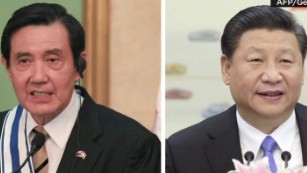Leaders of China and Taiwan set for first talks since 1949 split
Chinese President Xi Jinping is expected to shake hands, hold talks and share dinner with Taiwan President Ma Ying-jeou Saturday in a landmark meeting that could reboot relations between the two rivals or drive them further apart.
Separated by a sea channel and decades of mistrust, the leaders of China and Taiwan -- officially the People's Republic of China and the Republic of China -- haven't met since the two sides split in 1949 amid a bloody civil war.
The meeting, which takes place in Singapore, will be governed by complicated protocol reflecting the bitter history between the two. How they greet each other and what gestures they make will be closely scrutinized.
Both leaders will eschew their presidential titles and address each other simply as "Mr."
In a Thursday press conference, Ma said that the two sides would split the hotel and meal bill.

"No country would like to see war and conflict. If we can stabilize cross-strait relations, I believe other countries would love to see it too," Ma said.
Both sides have said that no agreements would be signed at the meeting and they would discuss ways to cement peace.
"If Xi tries to put down any markers about improving political ties or setting any deadlines for steps toward reunification, it will cause a massive anti-Beijing backlash across Taiwan," said Robert Manning, senior fellow at the Atlantic Council.
READ: Explained: Why historic meeting matters
China still considers the island a breakaway province and has warned that a formal declaration of independence could lead to military intervention.
To this day, it's reported to have missiles pointed at the island of 22 million people.
Despite the rift, China is Taiwan's biggest trade partner, hundreds of flights go between the two nations each week and Chinese banks now operate on the island, while some Taiwanese companies have factories in China.
Ma, former head of the Kuomintang (KMT) party, has been a key driver in forging closer ties since he came to power in a 2008 election.
Tsai Ing-wen, the head of the opposition Democratic Progressive Party (DPP) and the leading candidate to replace Ma in January elections, has spoken out against the meeting.
Analysts think the timing of the meeting is aimed at boosting the governing party's chances in the vote -- by sending a message that the KMT can best manage relations with China.
The KMT's candidate Eric Chiu is trailing Tsai and Ma cannot run because of term limits.
"The DPP is wildly ahead in the polls and will not only probably win, but it could be a landslide," said Manning.
"In the past, every time Beijing has tried to intervene to influence Taiwan elections, it has blown up in their face and been counterproductive."
News Courtesy: www.cnn.com











